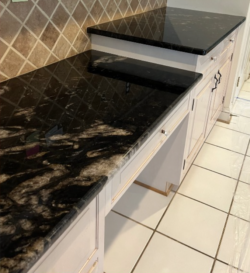
Do I need to seal my granite countertops? YES!
The only exception might be granite that is so dense, it only needs an initial sealer. Examples are some varieties of Uba Tuba and Absolute Black.
Why?
Sealing granite seals the pores of the stone and reduces the ability of water and oil-based compounds to penetrate and stain the stone. In addition, sealing reduces the ability of bacteria to penetrate the stone. When sealer is properly applied, it will penetrate deeply into the pores of the stone and seal them. It should not reside on the surface of the stone. You should not come in contact with the sealer while using your countertop, as it should reside below the surface.
How Often?
As with any product, the sealer eventually is absorbed into the stone and needs to be re-applied. Annually is a good general recommendation. We like to recommend sealing every 6 months for very porous granite that is used heavily.
How can I tell if my Granite needs sealing?
Test it by putting a 1-2 drops of water on the countertop to simulate a water-based stain. Add 1-2 drops of mineral oil in another area to simulate an oil based stain. Wait 5 minutes and wipe off. If it leaves a darkened spot, the granite needs to be sealed. Using water and mineral oil ensures that the dark spot won’t remain after your test, as they both will eventually evaporate.
Why should I use Surface Link rather than do it myself?
If you are handy, you can apply the sealer yourself. Be careful not to add too much sealer, or leave excess on the surface as a sticky coating will remain. Using Surface Link, you can be assured that the sealer is applied properly and your countertop is left smooth and in a natural state. We will remove hard water deposits around faucets and sinks too, adding value to our service.